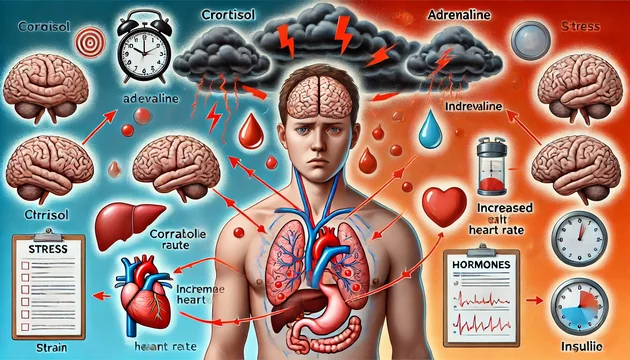Stress Is Silently Wrecking Your Body - Here's How to Stop It Now!

Stress is an unavoidable part of life, and our bodies are equipped with mechanisms to handle it. One of the key players in this process is cortisol, often referred to as the "stress hormone." While cortisol is vital for our survival, chronic stress can lead to imbalances that affect our hormonal health, causing a range of physical and mental health issues. In this article, we'll explore how stress impacts hormonal health, the role of cortisol, and practical strategies to manage its effects.
Understanding Cortisol: The Stress Hormone
Cortisol is produced by the adrenal glands, located just above your kidneys. It's a critical hormone that helps regulate various functions in your body, including metabolism, immune response, and blood pressure. When you encounter stress"”whether it's running late for an appointment or dealing with a more significant life event"”your body responds by releasing cortisol. This hormone prepares you to deal with the perceived threat by increasing your energy levels, focusing your attention, and even altering some of your bodily functions that aren't immediately necessary, like digestion"‹ (Mayo Clinic)"‹ (Cleveland Clinic).
The Double-Edged Sword: Benefits and Risks of Cortisol
In short bursts, cortisol is incredibly beneficial. It helps you react quickly in emergencies by increasing glucose (sugar) in your bloodstream, enhancing brain function, and helping repair tissues. However, problems arise when stress becomes chronic. Continuous exposure to high levels of cortisol can lead to a variety of health issues, including anxiety, depression, digestive problems, sleep disturbances, weight gain, memory impairment, and even heart disease"‹ (Mayo Clinic).
Cortisol and Its Role in Hormonal Health
Cortisol doesn't operate in isolation; it interacts with other hormones in your body, which can lead to broader hormonal imbalances when cortisol levels are consistently elevated. For instance, high cortisol levels can interfere with the production of thyroid hormones, which regulate your metabolism. It can also impact reproductive hormones, potentially leading to menstrual irregularities in women and decreased testosterone levels in men"‹ (NeuroLaunch.com).
Moreover, cortisol plays a crucial role in your body's sleep-wake cycle. Typically, cortisol levels peak in the morning to help you wake up and gradually decrease throughout the day. However, chronic stress can disrupt this cycle, leading to sleep problems and further hormonal imbalances"‹ (Cleveland Clinic).
Managing Cortisol Levels: Practical Strategies
Given the significant impact of cortisol on your health, managing stress and maintaining balanced cortisol levels is crucial. Here are some strategies that can help:
1. Exercise Wisely
Regular physical activity is one of the most effective ways to reduce stress and manage cortisol levels. However, it's important to strike a balance"”while moderate exercise can help lower cortisol, excessive or intense workouts can actually increase cortisol levels. Activities like brisk walking, yoga, or swimming are particularly beneficial"‹ (NeuroLaunch.com).
2. Mindfulness and Relaxation Techniques
Practicing mindfulness through meditation, deep breathing exercises, and progressive muscle relaxation can activate your body's relaxation response, which helps counteract the effects of chronic stress. These techniques not only reduce cortisol levels but also improve your overall mental health"‹ (NeuroLaunch.com).
3. Balanced Nutrition
Your diet plays a vital role in managing stress and maintaining hormonal balance. Consuming a diet rich in whole foods, lean proteins, and healthy fats can help stabilize blood sugar levels, which in turn supports adrenal function. It's also important to limit caffeine and alcohol, as these can interfere with cortisol production and disrupt sleep patterns"‹ (NeuroLaunch.com).
4. Healthy Sleep Habits
Ensuring that you get adequate sleep is crucial for keeping cortisol levels in check. Establishing a regular sleep schedule, creating a restful environment, and avoiding stimulants like caffeine before bed can help improve the quality of your sleep, thereby supporting better hormonal balance"‹ (Cleveland Clinic).
5. Seek Professional Help When Needed
If chronic stress is significantly affecting your daily life, relationships, or overall well-being, it may be beneficial to seek guidance from a mental health professional. They can provide personalized strategies and, if necessary, recommend medical interventions to help manage stress and cortisol levels effectively"‹ (NeuroLaunch.com).
The Role of Lifestyle in Hormonal Health
Maintaining a healthy lifestyle is not just about diet and exercise; it's also about how you manage your time and responsibilities. Prioritizing tasks, setting realistic goals, and learning to say no to unnecessary commitments can reduce your overall stress levels. Additionally, fostering strong relationships, engaging in hobbies, and maintaining a sense of humor can all contribute to lower cortisol levels and better hormonal health"‹ (Mayo Clinic)"‹ (NeuroLaunch.com).
The Importance of Balance
It's essential to recognize that cortisol is not the enemy. In fact, it's a necessary hormone that plays a crucial role in your ability to respond to stress. The goal is not to eliminate cortisol or stress entirely but to manage them effectively to prevent the negative impacts of chronic stress. By taking proactive steps to manage stress and support your body's natural processes, you can achieve a balanced cortisol rhythm, leading to better overall health and well-being"‹ (NeuroLaunch.com)"‹ (Cleveland Clinic).
Conclusion
Cortisol, the stress hormone, is an essential part of how your body responds to challenges. However, when stress becomes chronic, the continuous elevation of cortisol can lead to a range of physical and mental health issues. By implementing effective stress management techniques, maintaining a healthy lifestyle, and seeking professional help when necessary, you can keep cortisol levels in check and protect your hormonal health.